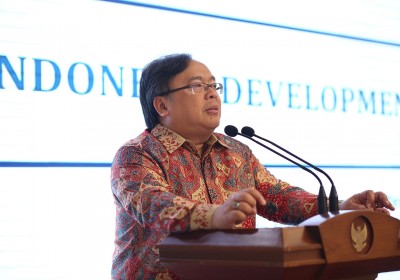IDF 2018: A Commitment to Overcome the Gaps of Among Regions in Indonesia
May 08, 2018
Jakarta- The National Development Planning Agency (Bappenas) will hold the second Indonesia Development Forum (IDF) event on July 10-11, 2018. The Forum is initiated by Bappenas and supported by the Australian Government through the Knowledge Sector Initiative – an Indonesian Australian Partnership Institution which aims at supporting Indonesian sustainable development which is based on knowledge, experience, and facts to accelerate the distribution of development outcomes in a more equitable and sustainable manner.
"IDF 2018 will address the theme 'Pathways to Tackle Regional Disparities Across the Archipelago'," said Minister of National Development Planning / Head of Bappenas Bambang P.S. Brojonegoro during the launching of IDF 2018 as well as the launching of Call for Papers for IDF 2018 on Thursday, March 22, 2018.
This forum is a follow-up of IDF 2017, which has the theme of “Fighting Inequality for Better Growth”. Minister Bambang said the topic was selected because Indonesia's development still faced challenges of development gaps among individuals and regions. If IDF 2017 addressed individual inequality, IDF 2018 will see inequality from the regional perspective.
The currently existing regional gaps, Bambang said, are indicated by the fact that about 80 percent of national economic growth derives from the western Indonesian regions, especially Java and Sumatra. Meanwhile, the contribution from eastern Indonesia is still not optimal. This is why President Joko Widodo prioritizes this region for infrastructure development.
"The infrastructure development (in Eastern Indonesia) includes the construction of Trans Papua road, the Kalimantan-East Nusa Tenggara border parallel roads, and Papua, and the development of the center of growth," said Bambang.
These infrastructure development aims to attract investments, especially for regions outside Java. Jokowi's administration is also trying to accelerate development in the foremost, outlying and underdeveloped areas, according to their specific characteristics.
To overcome the problem of inequality, the government needs inputs from various parties. Indonesia Development Forum is an initiative to collect thoughts or development ideas and to bring to the table academics and governments as stakeholders. This IDF will raise seven major sub-themes that are expected to provide solutions and development innovations.
The seven sub-themes include the Development of the Center of Growth: Challenges and Good Practices; Effort to Reduce Gaps in Underprivileged and Borders Areas; Basic Services’ Improvement to Reduce Regional Gaps; Utilizing the Potential of Digital Economy to Encourage Regional Development; Strengthening Connectivity in Indonesian Archipelago; Sixth, Innovation in Local Governance; Optimization of Development Funding Sources.
With such sub-themes, Bambang hoped the government would get inputs for developing the 2020-2024 Medium Term National Development Plan (RPJMN). The government is also committed to improving the equitable distribution of regional development and sustainability in all regions of Indonesia.
"Certainly this will be achieved through the synergy of good quality, transparent, accountable, and innovative development in all sectors," said Bambang.
This sustainable development will transform Indonesia into a new economic power in the world by 2025.
Charge d'Affaires of the Australian Embassy in Indonesia, Allaster Cox also supported the Indonesian government to conduct equitable development in Indonesia.
"Disparity is a common challenge and a top priority for both the Australian and Indonesian governments," Allaster said.
He said strong and equitable growth is the primary goal of economic partnership between the two countries.
**
Indonesia’s Research Institutions Supporting the Development of the Electric Vehicle Industry
Indonesian Muslim Fashion and Cosmetics IKMs Shine at Dubai World Expo 2020
Govt Steps Up UMKM Transformation Efforts in the Midst of Pandemic Slowdown
Govt Encourages Promotion of IKM Products in Digital Era
Government Begins Developing Maritime Training Center in Makassar
Tweets by IDDevForum
